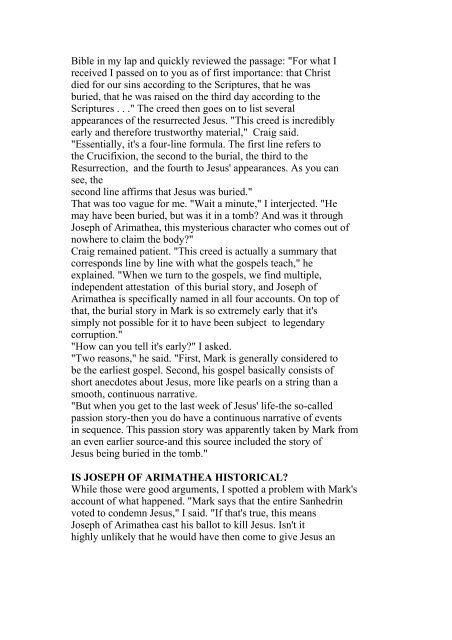The Case For Christ
The Case for Christ records Lee Strobel's attempt to "determine if there's credible evidence that Jesus of Nazareth really is the Son of God." The book consists primarily of interviews between Strobel (a former legal editor at the Chicago Tribune) and biblical scholars such as Bruce Metzger. Each interview is based on a simple question, concerning historical evidence (for example, "Can the Biographies of Jesus Be Trusted?"), scientific evidence, ("Does Archaeology Confirm or Contradict Jesus' Biographies?"), and "psychiatric evidence" ("Was Jesus Crazy When He Claimed to Be the Son of God?"). Together, these interviews compose a case brief defending Jesus' divinity, and urging readers to reach a verdict of their own.
The Case for Christ records Lee Strobel's attempt to "determine if there's credible evidence that Jesus of Nazareth really is the Son of God." The book consists primarily of interviews between Strobel (a former legal editor at the Chicago Tribune) and biblical scholars such as Bruce Metzger. Each interview is based on a simple question, concerning historical evidence (for example, "Can the Biographies of Jesus Be Trusted?"), scientific evidence, ("Does Archaeology Confirm or Contradict Jesus' Biographies?"), and "psychiatric evidence" ("Was Jesus Crazy When He Claimed to Be the Son of God?"). Together, these interviews compose a case brief defending Jesus' divinity, and urging readers to reach a verdict of their own.
You also want an ePaper? Increase the reach of your titles
YUMPU automatically turns print PDFs into web optimized ePapers that Google loves.
Bible in my lap and quickly reviewed the passage: "<strong>For</strong> what I<br />
received I passed on to you as of first importance: that <strong>Christ</strong><br />
died for our sins according to the Scriptures, that he was<br />
buried, that he was raised on the third day according to the<br />
Scriptures . . ." <strong>The</strong> creed then goes on to list several<br />
appearances of the resurrected Jesus. "This creed is incredibly<br />
early and therefore trustworthy material," Craig said.<br />
"Essentially, it's a four-line formula. <strong>The</strong> first line refers to<br />
the Crucifixion, the second to the burial, the third to the<br />
Resurrection, and the fourth to Jesus' appearances. As you can<br />
see, the<br />
second line affirms that Jesus was buried."<br />
That was too vague for me. "Wait a minute," I interjected. "He<br />
may have been buried, but was it in a tomb? And was it through<br />
Joseph of Arimathea, this mysterious character who comes out of<br />
nowhere to claim the body?"<br />
Craig remained patient. "This creed is actually a summary that<br />
corresponds line by line with what the gospels teach," he<br />
explained. "When we turn to the gospels, we find multiple,<br />
independent attestation of this burial story, and Joseph of<br />
Arimathea is specifically named in all four accounts. On top of<br />
that, the burial story in Mark is so extremely early that it's<br />
simply not possible for it to have been subject to legendary<br />
corruption."<br />
"How can you tell it's early?" I asked.<br />
"Two reasons," he said. "First, Mark is generally considered to<br />
be the earliest gospel. Second, his gospel basically consists of<br />
short anecdotes about Jesus, more like pearls on a string than a<br />
smooth, continuous narrative.<br />
"But when you get to the last week of Jesus' life-the so-called<br />
passion story-then you do have a continuous narrative of events<br />
in sequence. This passion story was apparently taken by Mark from<br />
an even earlier source-and this source included the story of<br />
Jesus being buried in the tomb."<br />
IS JOSEPH OF ARIMATHEA HISTORICAL?<br />
While those were good arguments, I spotted a problem with Mark's<br />
account of what happened. "Mark says that the entire Sanhedrin<br />
voted to condemn Jesus," I said. "If that's true, this means<br />
Joseph of Arimathea cast his ballot to kill Jesus. Isn't it<br />
highly unlikely that he would have then come to give Jesus an


















